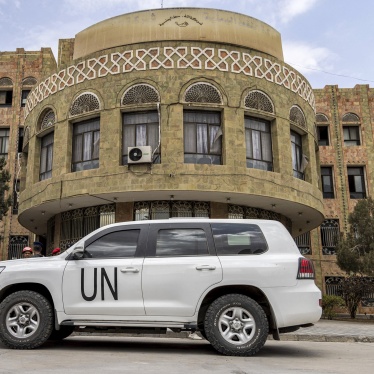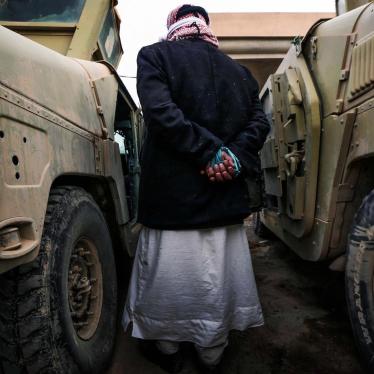The United States government should not override a federal court ruling and deport an Egyptian man based on vague promises that he will not be tortured on return, Human Rights Watch said today.
“The executive branch is snubbing the courts and relying on a no-torture promise from a known torturer,” said Jennifer Daskal, US program advocacy director for Human Rights Watch. “This makes no sense.”
In 2004, a federal appellate court ruled that Sameh Khouzam, an Egyptian man, should not be returned home because it was “more likely than not” that he would face torture. But the Department of Homeland Security wants to deport him anyway, relying on promises of humane treatment by the Egyptian government – so-called “diplomatic assurances” – to do so.
This is dangerous because the Egyptian government has broken such promises in the past, Human Rights Watch said.
In 2001, for example, Sweden – with the help of the CIA – returned two Egyptian asylum seekers, Ahmed Agiza and Mohammed al-Zari, to Cairo based on promises of humane treatment from the Egyptian authorities. Both men were subsequently tortured, suffering beatings and the use of electricity on their bodies, despite visits from Swedish diplomats. Two UN bodies – the Committee against Torture (CAT) and the Human Rights Committee – have since ruled that Sweden’s actions in the case violated the international ban on returning people to a risk of torture and that Egypt’s assurances did not suffice to protect the men against that risk.
In 2003, the United States abducted Abu Omar, an Egyptian cleric, in Milan and eventually transferred him back to Egypt where he was allegedly tortured, despite the US’s stated policy of obtaining “diplomatic assurances” of humane treatment any time it renders someone to a country with a known record of torture. Twenty-six CIA personnel have been indicted in Italy for Abu Omar’s abduction and rendition to torture, undermining US relations with one of its key allies.
“The Egyptian authorities have broken their promises not to torture suspects in the past,” said Daskal. “With such an appalling track record, it is cynical for the US to accept them as reliable.”
Background
Sameh Khouzam, a Coptic Christian, fled Egypt in 1998. When he arrived in the United States, he learned that his visa had been cancelled and he was immediately placed in immigration detention, based on the Egyptian authorities’ claim that he was wanted in Egypt on a murder charge. To date, the Egyptian authorities have not produced any evidence to support that charge.
Although Khouzam’s asylum application was denied, a US federal appellate court ruled that it was “more likely than not” that he would be at risk of torture if returned to Egypt, and should not be removed. But the US government claimed that it was seeking a no-torture promise from the Egyptian authorities and kept Khouzam in detention pending the receipt of such a guarantee.
In February 2006, after spending nearly eight years in immigration detention, a federal court granted Khouzam’s petition for habeas corpus and he was released on the condition that he would periodically report his whereabouts to immigration authorities. When he went to report on May 29, 2007, he was taken into custody again and told that the Department of Homeland Security had lifted his court-ordered deferral of removal, and that he could be returned to Egypt within days.
In a letter to Khouzam, the Department of Homeland Security said it had “sufficiently reliable” diplomatic assurances from the Egyptian government that Khouzam would not be tortured upon return. The letter indicates that the State Department secured the assurances in January 2007 and, as a result, Khouzam could be returned to Egypt as early as June 1.
Neither Khouzam nor his lawyers were informed that Khouzam’s stay of removal was terminated, nor have they been allowed to review the content of Egypt’s diplomatic assurances of no torture. The US government has argued that diplomatic assurances against torture are confidential and that revealing their content or the process undertaken to determine their reliability would undermine the ability of the executive branch to conduct foreign relations.
On May 31, a federal court granted a one-week stay of removal. Khouzam’s lawyers have also filed a habeas corpus petition on his behalf.
To view a Human Rights Watch Q&A on “Diplomatic Assurances” against torture, please visit:
https://www.hrw.org/backgrounder/eca/ecaqna1106/








